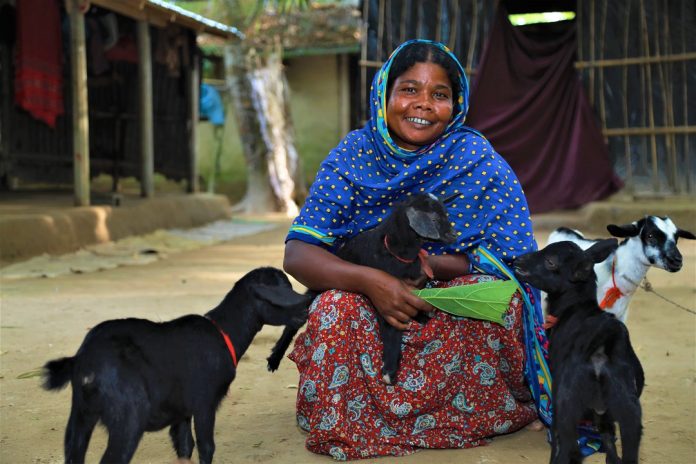Married off early and then abandoned by her husband within a few years, Taslima Begum did everything she could to support herself and her elderly mother, who is also physically challenged.
After her husband left her to marry someone else years ago, Taslima, now 40, knew she was on her own. She lost her father years ago, and has no siblings or relatives to go to.
She shifted between low-paying jobs, sometimes working as a day labourer and sometimes as domestic help in Galachipa of Patuakhali, a climate-vulnerable southern coastal district of Bangladesh.
Taslima was looking for something better, something sustainable.
She then took part in a goat-rearing training under the Prosperity project. After the training, she also received the financial support to buy some adult goats.
“We are too poor to do anything or become anything in life. Having been separated from my husband a long ago, I passed my days in immense hardship with my physically challenged mother. Now these goats are suddenly giving me the energy and hope to try and turn things around.”
Livestock rearing by extreme poor people, especially those having no land other than their homesteads, is proven to be a viable livelihood option. Backyard livestock rearing is less costly and risks are minimal. Taking these into account, the Prosperity project supports extremely poor households to set up a range of livestock-related Income-Generating Activities – goats, cows, native chickens, broiler chickens, Sonali chickens, various kinds of ducks, pigeons, Turkeys, etc.
In addition to cash support to buy the livestock, the project also makes financial and logistical arrangements for preparing sheds for the animals as well as the required fodder, disinfectant and medicine.
Visiting the participant households in regular intervals, the project’s technical officers provide hands-on training to household members on fodder management and disease prevention. For additional technical support, participants are linked with the local government service providers.
Simultaneously, the project established linkage with the local market players to ensure that the participants can buy the necessary inputs and sell their products at the right time and at the right price.


